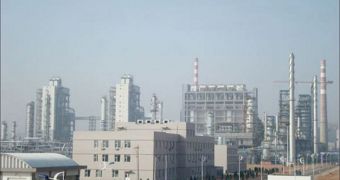One of the main methods through which China can avoid becoming dependent on foreign oil is if it extends its conversion program that transforms coal into oil.
The Asian nation wants to avoid becoming dependent on foreign resources, such as the United States is now. Authorities in Beijing are willing to invest massively to avoid such a faith.
The country is already the owner of the world's largest coal liquefaction plant in the world. At this point, China and South Africa are the only nations that pose such conversion plants.
The main reason why the largest economy in the world wants to convert coal into oil is that it has minute amounts of the former, and vast reserves of the latter. Most easily-accessible coal deposits are found in the Shanxi Province.
The need for more oil is prompted by the fact that the Asian nation now boasts the largest and fastest-growing automobile market in the world.
As more and more people reach a level of economic development where they can avoid car, the country is beginning to dace two new major problems – the need for oil, and traffic jams.
Just a couple of days ago, Beijing authorities announced that traffic at one of the entrances to the city had been jammed for days, and that thousands of cars were trapped in the messy situation.
The fuel supply problem could be easily addressed with liquid coal, the government believes, which is why China is now the country with the largest coal-oil conversion project underway.
However, there are some negative consequences to pursuing such a program. The most important one is that this type of conversion releases massive amounts of carbon dioxide as it takes place, Technology Review reports.
The second-most important is the fact that the process uses large amounts of water, another commodity that is scarce in China. In Beijing and other large cities in the northeast, water rations are nothing new.
But these drawbacks are unlikely to sway authorities from following on with their plans, analysts believe. There is no other course of action Beijing can take to ensure its energy independence.
“They do not have a better way to meet this need,” explains expert Qingyun Sun, who holds an appointment as a coal-to- liquids expert at the West Virginia University, in the United States.
To their credit however, the Shenhua Group – the managers of the conversion plant – has already begun a research project that could ultimately result in the capture of 80 percent of all emitted greenhouse gases.

 14 DAY TRIAL //
14 DAY TRIAL //